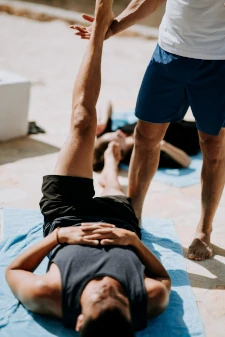Men: Take a New Approach to Your Health this Year
Wednesday, January 09, 2019, 12:25 PM
2019 is here, and we are starting the year off by raising awareness of men's health issues, such as prostate and testicular cancer, and mental health issues, such as depression, anxiety, and suicide rates.
The Movember Foundation reports that:

- men experience worse longer-term health than women and die on average six years earlier
- prostate cancer rates will double in the next 15 years
- testicular cancer rates have doubled in the last 50 years
- three quarters of suicides are men; half a million men take their own lives every year
Clearly, men's health is in a state of crisis. One of the goals driving the Movember Foundation is improving the quality of life of men everywhere.
Whether going through cancer treatment, recovering from treatment, or struggling with mental health, men need emotional and physical support to maintain their well-being.
Research from the University of British Columbia found that self-care activities help men deal with emotional trauma and encourage them to seek help while maintaining masculine ideals that are important to some men. Here are some ways holistic health can support men live full, happy, and healthy lives.
Reduce Stress and Anxiety
Men who suffer from depression, anxiety, or other mental health disorders likely feel stressed and overwhelmed. The pressures of everyday life, including work, family, and financial responsibilities, can further increase stress levels.
Better Health Victoria explains that, in general, men tend to put off getting support for emotional distress because they feel they need to portray the traditional masculine image of being tough, self-reliant, and in-charge. It can be difficult for men to acknowledge they are struggling.

Holistic practices such as massage and reflexology have been proven to reduce stress and induce feelings of relaxation.
Mindfully applying the mental and physical state felt in the treatment room to situations that arise in daily life can help men better cope with stress.
Yoga classes are a great way for men to meet others and build a support network.
Yoga has numerous health benefits, including maintaining a healthy nervous system, boosting the immune system, relieving pain, and increasing levels of serotonin, the "happy" chemical that regulates mood.
There are also specialty yoga classes that focus on various topics, including yoga for cancer, sexual trauma, Post-traumatic Stress Disorder (PTSD), and anxiety.
Attending these classes will ensure you are in a trauma-sensitive room with trained instructors and fellow students who share common experiences. This can be a great place to connect with others and find support.
Manage Pain
In 2017, The Canadian Cancer Society reported that 21,300 men were diagnosed with prostate cancer in Canada. That is approximately 58 men per day. Even more staggering, an average of 11 Canadian men die of prostate cancer every day.
Pain is a common side effect of cancer and its treatments and can be chronic, acute, phantom, breakthrough, or referred. The level of pain some people with cancer experience can interrupt daily activities, hinder sleep, and negatively impact mood and mental health.
Craniosacral therapy (CST) provides cancer-related pain relief in a gentle and non-invasive way. People with advanced tumours or who have just had surgery may find that massage therapy is too intense or causes pain. They need an alternative treatment that is less physical but still effective, such as CST.
Practitioners of Craniosacral therapy use light touch to manipulate the spine, skull, cranial sutures, and fascia to detect disturbances in the cranial sacral rhythm.
Research has shown that CST has a positive effect on pain reduction, promotes relaxation, and reduces stress. There are also limited contraindications to the practice, making it safe for almost everyone.
Improve Nausea and Reduce Fatigue
A common side effect of chemotherapy is nausea and fatigue. Research has shown that aromatherapy and reflexology relieve fatigue related to cancer. Both of these practices have also been shown to improve nausea.
Ginger and peppermint essential oils are well known for their ability to sooth the stomach and reduce nausea. Lavender oil is another versatile option that is recommended to both ease stomach upset and calm anxiety.
All of these oils can be diffused in the air; inhaled with steam, such as added to a hot bath or bowl of warm water; or used during a massage or reflexology treatment.
Acupressure involves stimulating certain acupoints in the body to improve imbalances and promote energy flow. Reflexologists stimulate reflex points — or acupoints — in the hands, ears, and feet to affect change in corresponding organs of the body.
The treatment is non-invasive and relaxing, making it a good option for those experiencing cancer-related nausea and fatigue.
Whether you are a man who is facing health issues or someone who supports a loved one who is struggling, start 2019 with awareness of how you can be an advocate for men's mental and physical well-being.

